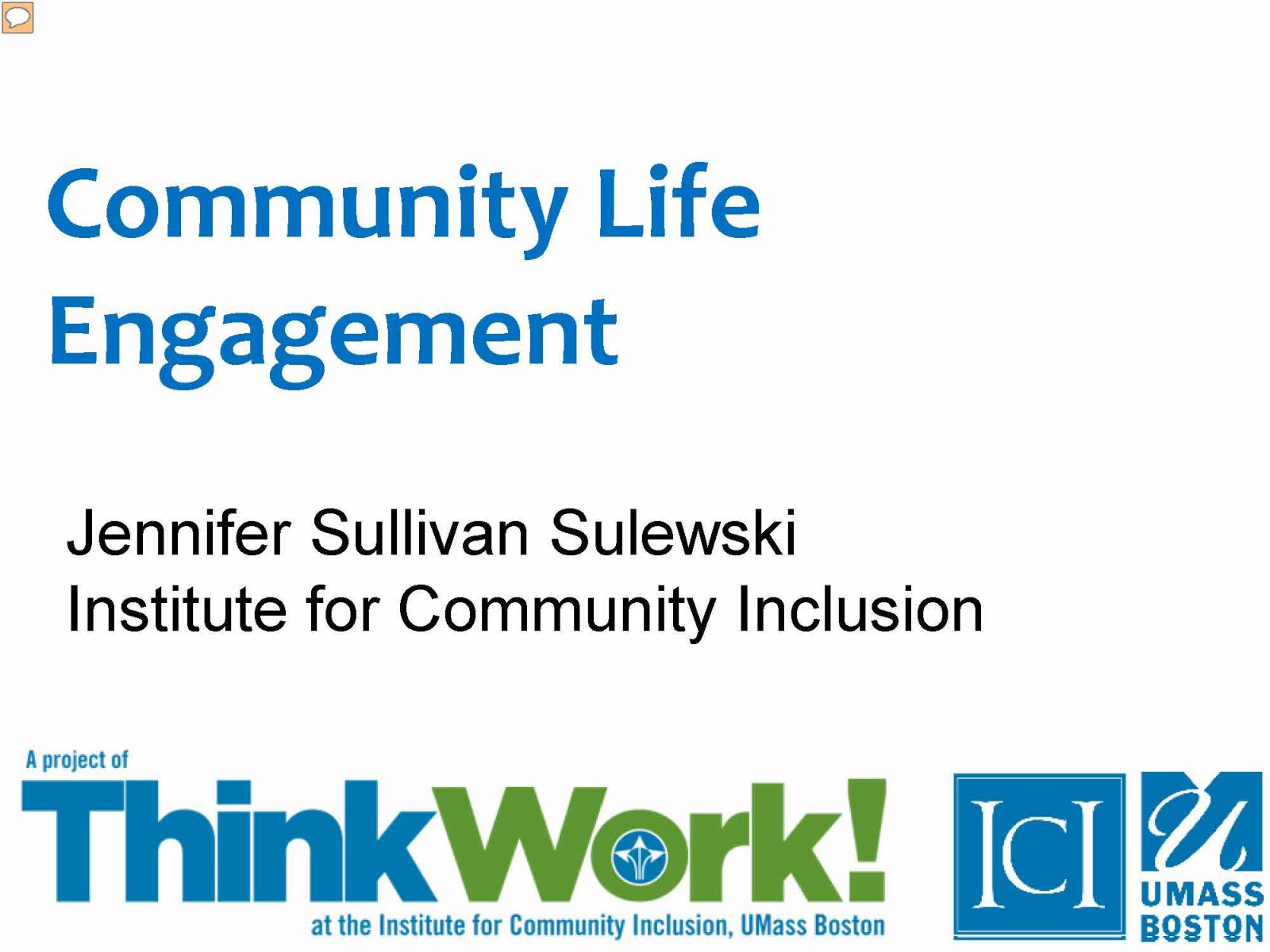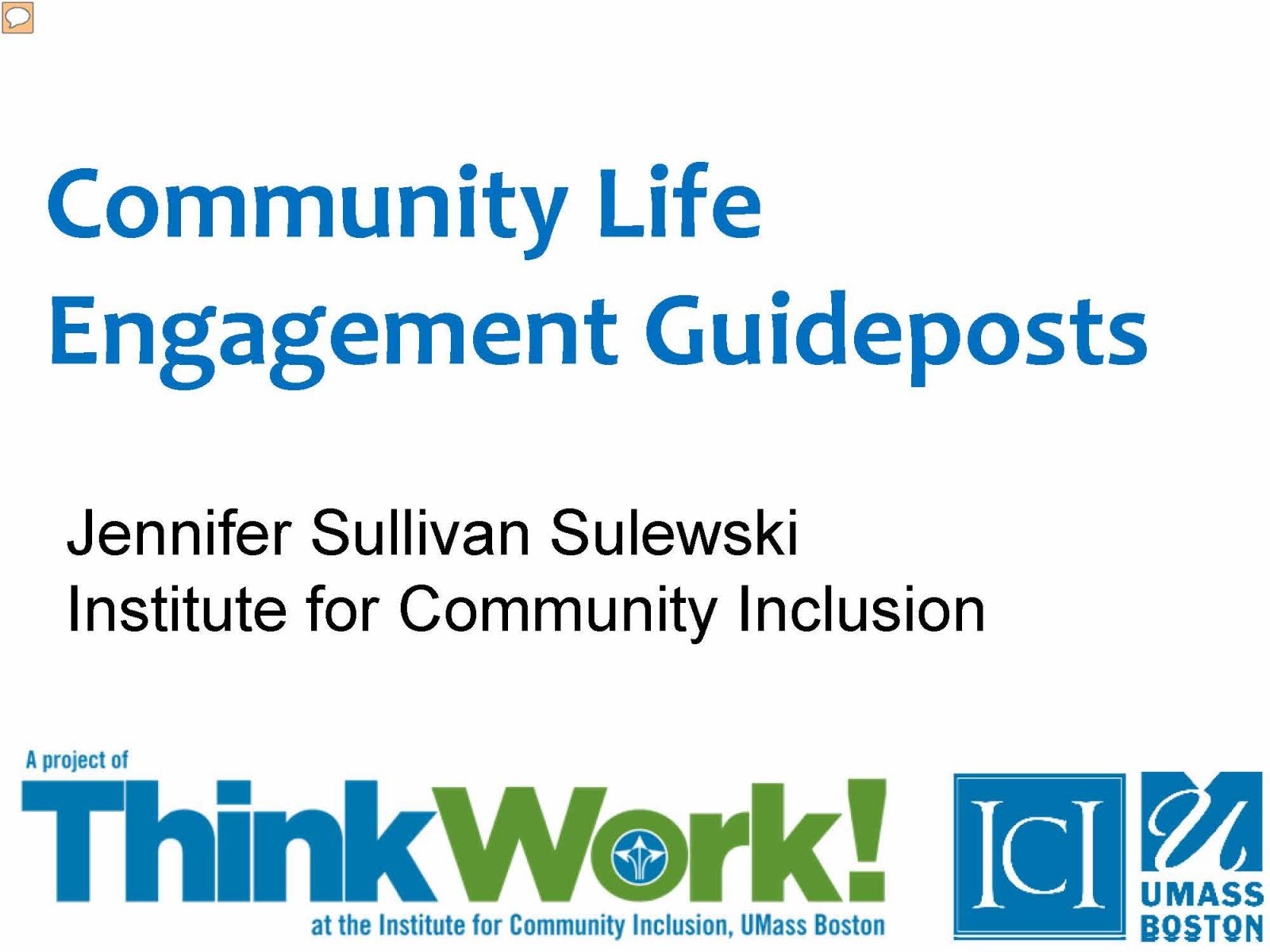Jennifer Sulewski
Jennifer Sulewski, Ph.D., FAAIDD is a national expert on community life engagement (CLE) for people with IDD. She has authored numerous peer-reviewed publications on CLE, has presented locally and nationally at conferences on CLE, and has provided consultation to state agencies and service providers across the country on how to improve day services and supports. From 2014–2017 she was PI of the Field Initiated CLE Project, a NIDILRR-funded effort to study how to improve day services and supports for CLE, which led to identification of Four Guideposts for Community Life Engagement and a toolkit for service providers. Currently she is PI of another Field Initiated project developing a Guideposts Fidelity Scale for service providers to assess their level of adherence to the Four Guideposts for CLE. Dr. Sulewski is a Fellow of the American Association of Intellectual and Developmental Disabilities and past co-chair of the Disabilities and Other Vulnerable Populations Topical Interest Group of the American Evaluation Association. She received her Ph.D. in Social Policy from Brandeis University in 2006, with a dissertation titled In Search of Meaningful Daytimes: Community-Based Nonwork Supports for Adults with Developmental Disabilities.
Guidepost 4: Ensure That Supports Are Outcome-Oriented and Regularly Monitored
We have created a series of four Engage Briefs to examine the guideposts in detail. This brief explores the need to create supports that oriented toward goals and outcomes, and to implement a plan for monitoring progress.
Guidepost 2: Promote Community Membership and Contribution
We have created a series of four Engage Briefs to examine the guideposts in detail. This brief explores the need to implement a plan to help individuals participate in and contribute to their communities.
Partnerships in Employment: Supporting Adults with IDD in Their Communities
This brief provides an overview of how to best support adults with IDD in their communities and in their pursuit of integrated employment.
Click here to read the full brief
Fading Supports at SEEC
SEEC (Seeking Equality, Empowerment, and Community) is a Maryland-based provider of employment, community living, and community development supports to people with intellectual and developmental disabilities (IDD). Like many providers of individualized supports, SEEC has had to find creative ways to individualize supports even though its funding structures do not support 1:1 staffing. One way they do this is by deliberately building both human capital (community living skills) and social capital (relationships in the community).
Delphi Panel Findings #7: Paths Toward Fair Wages
This is the seventh and final brief in our series on the findings from a Delphi process conducted by the Employment Learning Community in 2013–2014. More information on the Employment Learning Community and the Delphi process can be found in Brief #1 (Introduction, Values, and Overall Themes). This brief focuses on the final priority area for policy and practice change: creating paths toward fairer wages for individuals with IDD. Read the brief here.
Delphi Panel Findings #6: Generation and Use of Data and Evidence
This is the sixth in a series of briefs on the findings from a Delphi process conducted by the Employment Learning Community in 2013–2014. More information on the Employment Learning Community and the Delphi process can be found in Brief #1 (Introduction, Values, and Overall Themes). This brief focuses on how data and evidence can support integrated employment outcomes for individuals with intellectual and developmental disabilities (IDD). This was the fifth overarching theme among the Delphi panel’s recommendations.
Delphi Panel Findings #5: Processes Within State Agencies
This is the fifth in a series of briefs on the findings from a Delphi process conducted by the Employment Learning Community in 2013–2014. More information on the Employment Learning Community and the Delphi process can be found in Brief #1 (Introduction, Values, and Overall Themes). This brief focuses on the fourth priority area identified by the Delphi panel: improving policies and processes within state agencies related to employment for people with intellectual and developmental disabilities (IDD).
Delphi Panel Findings #4: Education and Training for Job Seekers
This is the fourth in a series of briefs on the findings from a Delphi process conducted by the Employment Learning Community in 2013–2014. More information on the Employment Learning Community and the Delphi process can be found in Brief #1 (Introduction, Values, and Overall Themes). This brief focuses on the role of education and training for job seekers with intellectual and developmental disabilities (IDD), which was the third-ranked overarching priority among the Delphi panel members.



